Hunger and hardship behind every leaf
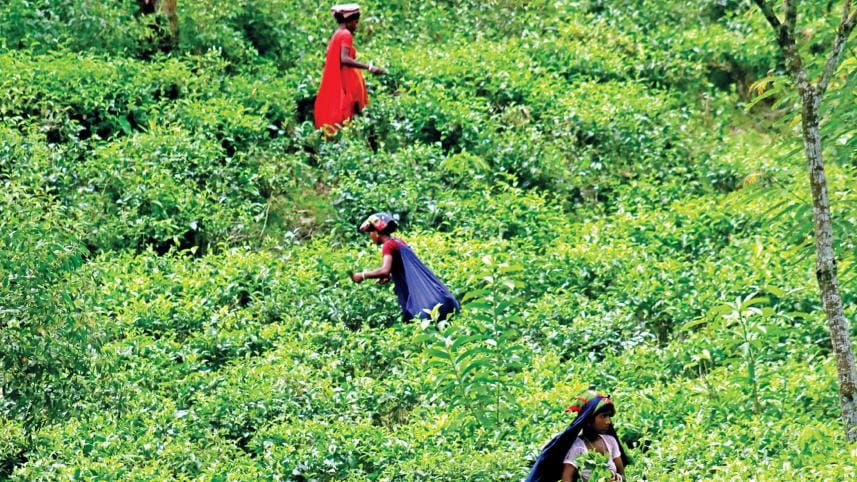
Every day before dawn, Sukalmoni Rikiyashon wakes up in a cramped tin-roofed house nestled in a tea estate of Kamalganj upazila in Moulvibazar.
She prepares flatbread and tea for her nine-member family and rushes to the garden by 9:00am, already weary.
Four months pregnant with her second child, the 18-year-old spends the whole day plucking tea leaves, clearing weeds and carrying heavy loads under the scorching sun.
She earns Tk 187.42 a day and also gets rations.
Her husband, a day labourer, gathers firewood from nearby forests to supplement their meagre income.
For the expecting mother, there is no access to maternal healthcare, no nutritious food and no rest.
Sukalmoni's story is not unique. Thousands of women across Bangladesh's tea estates endure a daily cycle of malnutrition, physical exhaustion and systemic neglect.
A 2022 study titled "Tea Garden Workers and Their Food Security Assessment", conducted among 100 tea workers in Barlekha upazila, found that most women were underweight.
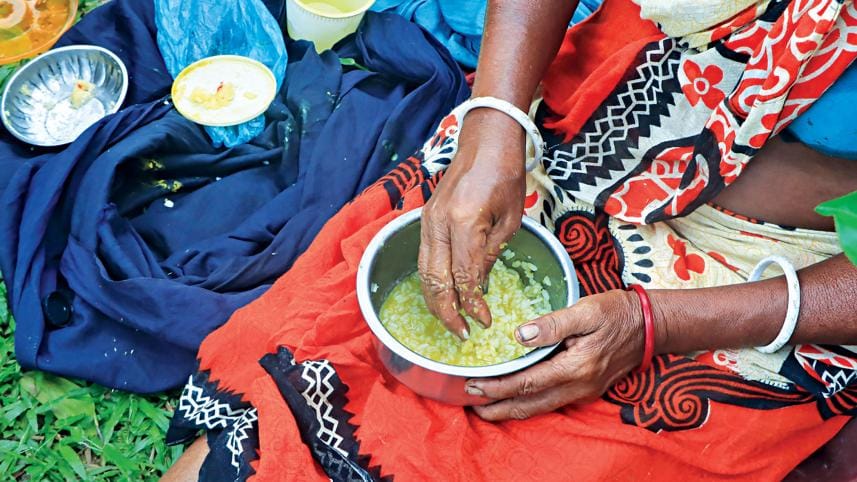
About 78 percent of their diets consisted of carbohydrate-heavy foods, mostly rice, with protein, vegetables and fruits almost absent.
A recent study by the Global Alliance for Improved Nutrition (GAIN) found that 39 percent of adult tea workers were underweight, with women disproportionately affected as 64 percent fell into this category.
Around 80 percent lacked basic nutritional knowledge, and 83 percent reported not consuming any meat in the previous week.
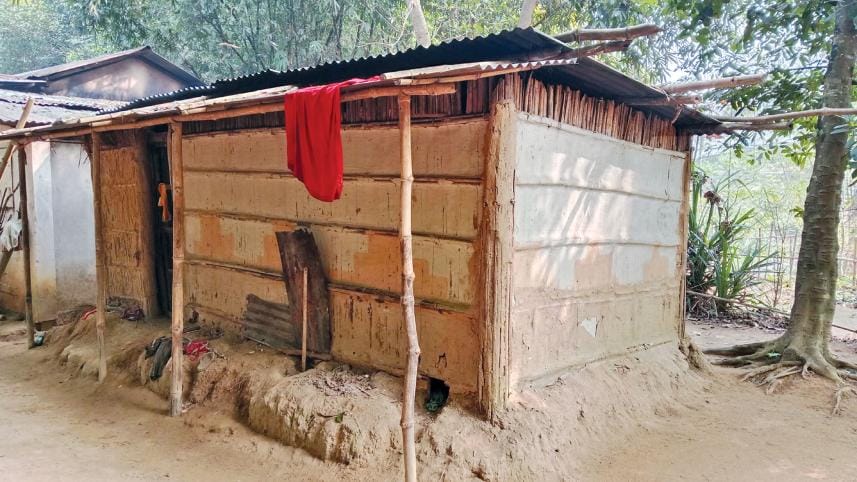
A field-level survey by The Daily Star among 22 tea garden workers in Sylhet and Moulvibazar supported these findings. Of the respondents, seven reported a pregnant woman in the family. The average family size was six, and their average monthly income stood at Tk 6,995.
Diets were carbohydrate-heavy, with only occasional protein and rare intake of vegetables, fruits or dairy. No change in diet was reported for pregnant women.
Among the 22 workers, 95 percent reported experiencing issues such as anaemia, stunted growth, night blindness, skin disorders, hair loss or frequent infections.

Shapon Mirdha, a mother of two, said, "During my pregnancy, I received no medical check-ups. I gave birth at home with the help of a midwife."
A community health provider at a clinic in Sreemangal's Khaichhara Tea Garden, requesting anonymity, said of the 20 women they screened the previous month, 16 were suffering from anaemia caused by malnutrition.
Children are similarly trapped in cycles of malnutrition. A 2020 study titled "Nutritional Status Among School-Age Children of Bangladeshi Tea Garden Workers", which surveyed 168 children in Moulvibazar's Kulaura upazila, found that 32 percent were suffering from stunted growth, 50 percent were underweight and 49 percent were frail or extremely thin.
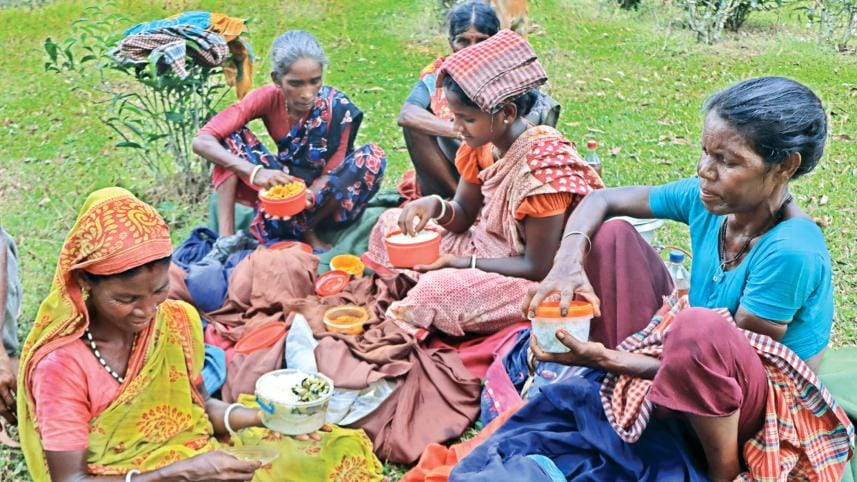
Around 60 percent had anaemia, 34 percent had vitamin A deficiency, and 85 percent of their families faced food insecurity.
A separate survey conducted by The Daily Star among 20 primary school children in the same region showed that their meals typically consisted of plain rice and lentils, with protein appearing only once or twice a week.
Many reported attending school on an empty stomach, while around 65 percent did not attend school regularly. Additionally, 12 percent reported experiencing moderate food crises at home, while others said their families faced frequent shortages.
A teacher at Luyaiuni Tea Garden Government Primary School said, "Some students are too weak to participate in school activities."

For many tea workers, affording basic food staples is a daily struggle. With rice prices between Tk 60–70 per kg, and lentils, vegetables, fish and meat significantly more expensive and beyond their purchasing power, most rely almost exclusively on rice to meet their calorie needs. On average, a woman worker can spend no more than Tk 25–30 per meal.
Dr Rudaba Khondker, country director of GAIN Bangladesh, attributed the crisis to low wages, poor education and lack of healthcare access.
She emphasised that investing in nutrition could significantly improve worker productivity and economic returns.
Citing findings from the Global Nutrition Report and the World Bank, she said every dollar invested in nutrition can yield up to $16 in return.
The ILO has similarly observed that adequate nutrition could boost productivity by as much as 20 percent.
Nipen Paul, general secretary of Bangladesh Cha Sramik Union, said workers currently receive two annual festival bonuses, totalling around Tk 10,500. They also get around 3.5 kg of rice or flour each week at a subsidised rate of Tk 2 per kg, small huts within the garden premises, access to some agricultural land, primary schools and basic healthcare.
However, he said these facilities are "very nominal" given the rising cost of living.
A comparative analysis by GAIN shows that tea workers face a far deeper nutritional crisis than another vulnerable group, ready-made garment workers.
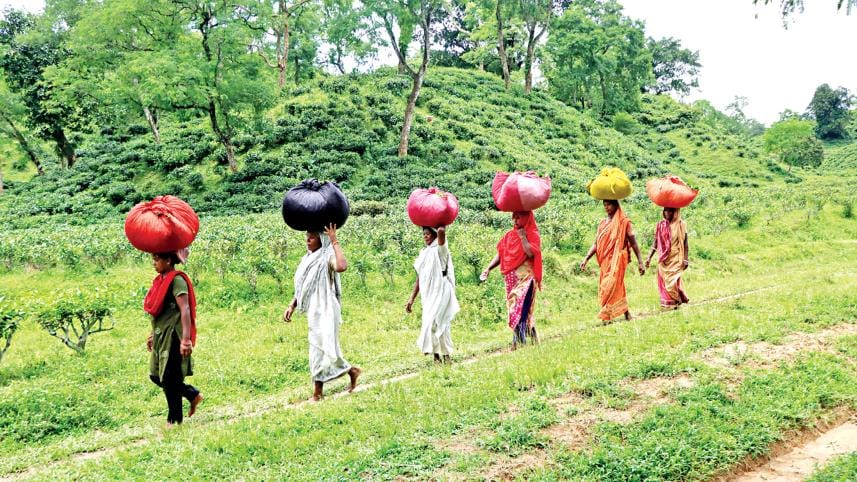
Tea workers earn half as much per month as RMG workers. Their average daily calorie intake remains at 1,795 kcal, well below nutritional standards, while RMG workers typically consume 1,900–2,100 kcal per day.
RMG workers, while not free from nutritional challenges, benefit from workplace health services, Fair Price Shops and targeted nutrition programmes.
Since 2020, interventions like midday meals and iron-folic acid supplements have improved their diets and health outcomes. Tea gardens, by contrast, are only beginning to explore workforce nutrition initiatives through a newly formed alliance.
Employers, tea estate owners and government agencies have clear obligations to ensure the health and nutrition of tea workers under national labour laws and health policies. Still, most tea worker families remain excluded from government-run food-friendly programmes, said experts.
Particularly, the TCB's subsidised food distribution system is yet to reach most tea estates, they added.
Local union parishad members and health officials admitted that tea workers are often missing from official beneficiary lists.
Out of 22 respondents in The Daily Star survey, 20 reported receiving no government food aid, while two said they received occasional support.
Nurul Alam Masud, secretary of the Bangladesh Food Security Network–KHANI, described the situation as a human rights crisis. He called for inflation-adjusted wages, universal ration cards for tea worker families, and a special Garden Nutrition Card for targeted food support.
He also urged the government to integrate tea workers into national food security programmes.
Muhammad Shahidul Islam, director of the Department of Social Services in Sylhet division, said his department provides a one-time grant of Tk 6,000 to 25–30 tea workers per garden.
He added that their housing project has supported 8–10 workers in each estate.
Sanjay Kanta Das, adviser of the Cha Sramik Oikya, said, "Women tea workers are doing the hardest labour on the lowest nutrition. With only dry bread and salted tea to survive on, anaemia and malnutrition have become the norm. The authorities shouldn't expect the tea industry to be productive without meeting the workers' basic nutritional needs."
Rambhajan Kairi, former general secretary of Bangladesh Tea Workers Union, said, "Over 50 percent of tea workers are malnourished. The condition is worse among women. Its effects are visible in tea production and in family health. If no steps are taken, the industry may collapse."
Kamran Tanvirur Rahman, chairman of the Bangladesh Tea Association, acknowledged that nutrition is vital for worker productivity.
"But the tea industry is itself struggling to survive," he said. "Wages have increased, and when support like subsidised food, free housing and basic healthcare is added, workers receive benefits worth over Tk 500 per day. Still, we are selling tea below production cost and operating gardens on loans with 13–14 percent interest rates."
"Without government support, especially in reducing loan interest rates and recognising tea as part of the agriculture sector, we lack the capacity to do more for workers. The health of workers and the survival of gardens are interdependent," he added.

 For all latest news, follow The Daily Star's Google News channel.
For all latest news, follow The Daily Star's Google News channel.
Comments